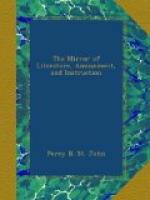The high character of the Earl of Eldon as Chancellor is thus lucidly drawn by Sir Egerton Brydges: “Of all who, in the long lapse of ages, have filled the sacred seat on which he now (1823) sits, none ever had purer hands, none ever had a conscientious desire of equity more ardent and more incessant than Lord Eldon. The amazing expanse of his views, the inexpressible niceness of his discrimination, his unrelaxing anxiety to do justice in every individual case, the kindness of his heart, and the ductility of his ideas, all ensure that attention to every suitor which must necessarily obtain the unbounded admiration and attachment of the virtuous and the wise. Lord Eldon’s eloquence,” continues Sir Egerton, “is rather adapted to cultivated and thinking minds than to a popular audience. It generally addresses the understanding rather than the fancy. It frequently wants fluency, but occasionally is tinged with a high degree of moral pathos.”
We could illustrate the conscientious character alluded to by the above writer, with anecdotes of the chancellorship of Lord Eldon. As the following have, we believe, but once appeared in print, they may not, be familiar to the reader. Sir Richard Phillips relates:[3] “In conversation with Mr. Butterman, (at Dronfield), I heard two anecdotes of Lord Eldon, which, as an example to Lord Chancellors, and to public spirited parishioners, I consider it my duty to introduce. The incumbent, some years ago, thought proper to propose an exchange with an incompetent clergyman; when Mr. B., as a friend to the church, and some of his respectable neighbours took alarm at the negotiation, and in the commencement he penned a letter to the Chancellor. The other parties calculated on the arrangement, but, on applying to the Chancellor he could consent to no exchange, but that if the parties were tired of their positions, they might respectively resign, and there were plenty of candidates. The determination was final, and the scheme of exchange was abandoned. In another instance, a master had been regularly appointed to the grammar school at Dronfield, on liberal principles of education, but, within a few years, some prejudice was excited against him, and the churchwardens for the time thought proper to stop his salary. On this occasion, Mr. B. and some friends combined in an application to Lord Eldon, and his lordship instantly directed the churchwardens to render an account of the trust within a few days. They claimed time, and were allowed a month, when, without other form, he directed the salary to be paid to the appointed master, with all expenses.”
[3] In his Personal Tour through the United Kingdom, Part iii.
Newcastle contains memorials of Lord Eldon which indicate that the inhabitants are proud of their distinguished fellow-freeman. A spacious range of elegant buildings is called Eldon Square: and in the Guildhall is a portrait of his lordship, opposite that of his brother, Lord Stowell.




